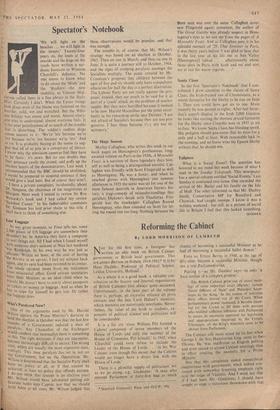Who's Paralysed Now?
One of the arguments used by .Mr. Harold Wilson against the Prime Minister's decision to hold the election in October was that the last few months of a Government induced a state of Paralysis_ Any Chancellor of the Exchequer w°1-141 confirm that (normally) there is something to this. The right decisions, if they are unpopular, become increasingly difficult to secure. The wrong ones, which are usually the most expensiVe ones, multiply, This time paralysis has set in not on the e Government, but on the Opposition. Mr. Wilson is determined that the Socialist Party shall have no Policy at all, or if that cannot be
achieved, at least no policy that offends anyone. I _ do not think that (except in an election year)
r. Wilson would have advocated putting dtir heaviest tanks into Cyprus, nor that we should hold Aden arall costs. Mr. Wilson judged that
these observations would be popular, and that was enough.
The trouble is, of course, that Mr. Wilson's strategy was based on an election in October. 1963. Then on one in March, and then on one in June. It is quite a journey still to October, 1964, and the signs of creeping paralysis amongst the Socialists multiply. The panic created by Mr. Crossman's proposal that children between the ages of five and six should only have compulsory education for half the day is a perfect illustration. The Labour Party are not really against the pro- posal. Indeed, they sec much to be said for it as part of a 'crash' attack on the problem of teacher supply. But they were horrified because it seemed to be new. Harold Macmillan put the point excel- lently in his rewarding sortie into Devizes. 'I am not afraid of Socialists because they are too pro- gressive. I fear them because th..y are too re- actionary.'


































 Previous page
Previous page